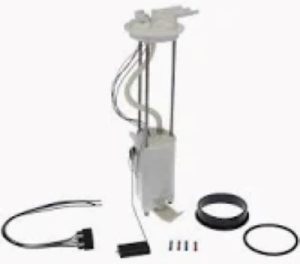In fact, low-quality Fueld Pumps may result in a wide range of vehicle problems that will ultimately have to be repaired at the cost of the driver and over time also bring about performance loss. And the one obvious effect is erratic fuel pressure because these pumps often don't keep up with demands that require a constant 40 - 60psi for optimum basic engine operation. As the PCV system routes vaporized fuel oil back into your intake, if it is not closed off properly with a check valve while under boost you get high pressure in one direction and oftentimes negative pressure when there should be another. — This variance of air pressures can cause engine sputtering, misfires or even stalling (especially on acceleration). Studies show that vehicles using low-quality Fuel Pumps can consume as such as 10–15% more fuel, because a faulty vehicle usually consumes extra fuel in order to achieve better power.
Poor manufacturing and inadequate materials in inferior Fuel Pumps — as is the nature of most things cheaply made — provide a briefer existence, with mediocre pumps failing at paltry rates (often around 20,000 miles) compared to good quality ones which can last up to over 100k. By changing brake pads more frequently not only cost drivers higher prices but also have vehicles out of service longer, a difficult dielm for comerial or high mileage drives. One high-profile example was a large vehicle fleet operation that claimed its repair bills had increased by one-fifth after it switched to budget Fuel Pumps before reverting back to OEM-standard pumps because of the reduced maintenance hour lost.
Low-Quality Fuel Pumps Overheating The most important reason why cheaply manufactured water pumps are high-temperature failure prone is that they were not designed to resist substantial heat. Under high-demand conditions like towing or long trips, these pumps can overheat and cut out fuel delivery. Automotive experts argue that since overheating wears down the internal components in substandard Fuel Pumps up to 30% faster, it consequently fails prematurely which ultimately incurs an even higher maintenance costs.
Low-quality Fuel Pumps that failed to a larger extent place issues of contamination frequently. Badly processed fuel can bring in dirt and particles into the engine, which also runs the risk of obstruction as well as wear on injectors, in addition to various other gas system parts. According to the data, vehicles were subject to a twenty-first-century version of planned obsolescence; cars exposed more frequently and at higher levels could potentially need their injectors replaced every 30k miles–compared with replacement intervals pushed out as long as 100K miles when fitted with better-quality filtration. The result is loss of performance, continued diminishing fuel economy and increased maintenance costs as dirty injectors are forced to work even harder robbing the engine down low.

The noise levels in the cheaper ones are usually higher because of low quality materials and design. Certainly, what you pay for is often silent pump operation; cheaper pumps—especially as they age—produce an increasingly audible whine or hum. Such noise indicates increased internal friction that not only makes drivers uncomfortable, but also implies the movement of further pump elements. Noise levels on Fuel Pumps typically rise by over 20% as the this pump dies, which has mechanics cautioning of imminent failure.
Although not as directly dangerous, low-quality fuel pumps can still affect safety and leave drivers stranded if they fail without warning while someone is driving. An unexpected pump failure will result in engine stalling, which can be risky on highways and during rush hour. The increasing prevalence of Fuel Pumps can be highlighted by statistics which reveal that approximately 5% of all breakdowns on major highways are contributed to the failure in one these vital Innopa Fitparts, underscoring its potential for danger and safety threat if a driver receives an inferior part. Better choose a high-quality Fuel Pump to save you from sudden surprises, providing an anticipated secure operation.
Purchasing a quality Fuel Pump improves fuel economy and engine performance, which lowers repair costs long term as well as safety hazards. For more information on how to choose a high-performance Fuel Pump conforms durable standards, you view the manufacturer's recommended options at FuelPump+ for better choices that can improve vehicle performance and enhance driver safety.
